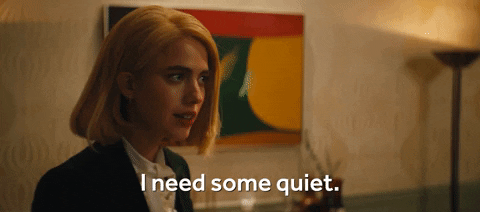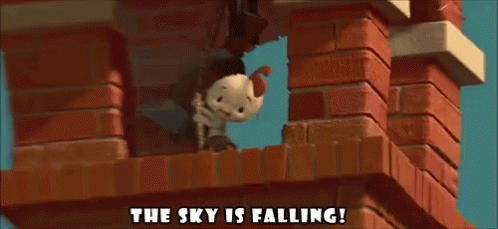Memo: The sky is falling.
Chicken Little, your email privileges are revoked.
Hello there, guest writer Andrea here! Rachel and I chat - a lot - about how to keep focus at work. As an ADHD girly in a world that never slows down, I thought it was about time to share what I’ve adopted. Maybe what works for me could also work for you, and if this helps even one person make their workload more bearable, it'll be all worth it. So, let’s get into it!
Have you ever worked with someone that makes you feel like the sky is about to fall at any moment?
Their urgency in everything they do can sometimes make it seem like the fate of the universe depends on that email response or that instant reply on Slack.
But spoiler alert: it rarely does, and it forces everyone into a perpetual state of chaos.
When I started my career I made it a point to reply to every message and inquiry as soon as I got it, thinking that my clients or bosses would appreciate the quick reaction. Guess what? They didn’t. Instead, I was teaching them to expect instant responses for everything. I wanted to be their superhero, instead, I felt like a frantic chicken, darting between critical tasks without a moment to focus.
I stopped tolerating the Chicken Little culture and you can too - by remembering two simple truths.
Truth 1: Answering emails right away teaches people to be impatient and only makes the panicked coworkers of the world more powerful.
One day, while drowning in pings, I had my lightbulb moment. I realized that not every message was a call for immediate action. Most could wait until I finished my coffee or, dare I say, enjoyed a lunch break without being glued to the phone. The sky was not falling.
So, I changed my game. Instead of rapid-fire responses, I adopted intentional communication. I set specific response times and made it clear that I'm not tied to my inbox 24/7. The result? The people I worked with started appreciating the thoughtful replies and felt reassured that when I did respond, it was genuine and considered. And, bonus, they (mostly) stopped sending me things last minute. Win.
Truth 2: Answering emails right away makes you less focused and productive.
If you let every “crisis” break your focus, you won’t get anything done. Even if it feels you are! Trust me: break the cycle of instant gratification for the chaotic people you work with and for yourself. Just wait a beat. Then five beats. Then a few minutes. Then an hour. And see how much better life feels.
By waiting, you focus on quality over speed, delivering well-thought-out responses rather than rapid-fire reactions. And bonus, it reduces the stress levels across the board because you get your work done without distraction.
Have you found yourself trapped lately in the urgency spiral, feeling like every ping sets you back an hour in a race against the end of the day?
If that’s the case, here are some tips that you can implement right away.
Set up a designated time to answer emails and other messages: Block a portion of your day, preferably no more than an hour at a time, on your calendar to concentrate on clearing your inbox and responding to emails. This focused approach will ensure that each email and message receives the attention it deserves. Trust me: If it’s a real crisis, they’ll find a way to get ahold of you.
Establish boundaries: Make it clear to your clients and teammates that you're not available 24/7. Setting boundaries is crucial for maintaining a healthy work-life balance and preventing burnout. Emphasize that doing this allows you to provide more thoughtful and effective responses, ultimately benefiting the quality of the work you deliver. Make it clear what an emergency is (responding to a minor email is NOT it) and how to get ahold of you when there is one.
Communicate your response times: Make your availability clear to both your team and clients. Establish reasonable response times and communicate them openly. This transparency helps manage expectations and reduces the pressure on you to respond instantly.
Avoid the constant ping-pong: Turn off unnecessary notifications, especially during work hours. Constant interruptions can derail your focus and productivity. By minimizing these distractions, you create a conducive environment for deep work and give yourself the space to handle emails and messages more effectively when it’s time. This also makes us far more helpful in a crisis (on the low chance one, you know, appears).
Remember, reclaiming control over your time and responses doesn't mean you are neglecting your responsibilities, it means you are taking proactive steps to manage them more efficiently. It also means that you acknowledge that living under a constant state of urgency is neither sustainable nor productive.
TLDR: Taking control of your time is a proactive move towards a healthier, more sustainable work routine. One that allows you to excel in your responsibilities without sacrificing your overall well-being for a non-critical “crisis.”
x Andrea & Nice Work
PS: Have you tried any of this before? Did you notice any positive changes? Anything go terribly wrong? We'd love to hear your story - drop us a reply or comment.






OMG! I'm an old dog who only recently learned this trick. I started my professional career in 1989 as a reporter — BEFORE email. The daily deadlines meant calling people back immediately. Then instantly responding to what your editors, peers or sources wanted. I couldn't break that habit after 19 years. It's only been in the last couple of years that I have started waiting to respond to emails. Scheduling the time is what I need to do. That way I can do a better job of completing tasks without the distractions. Thanks so much for sharing.